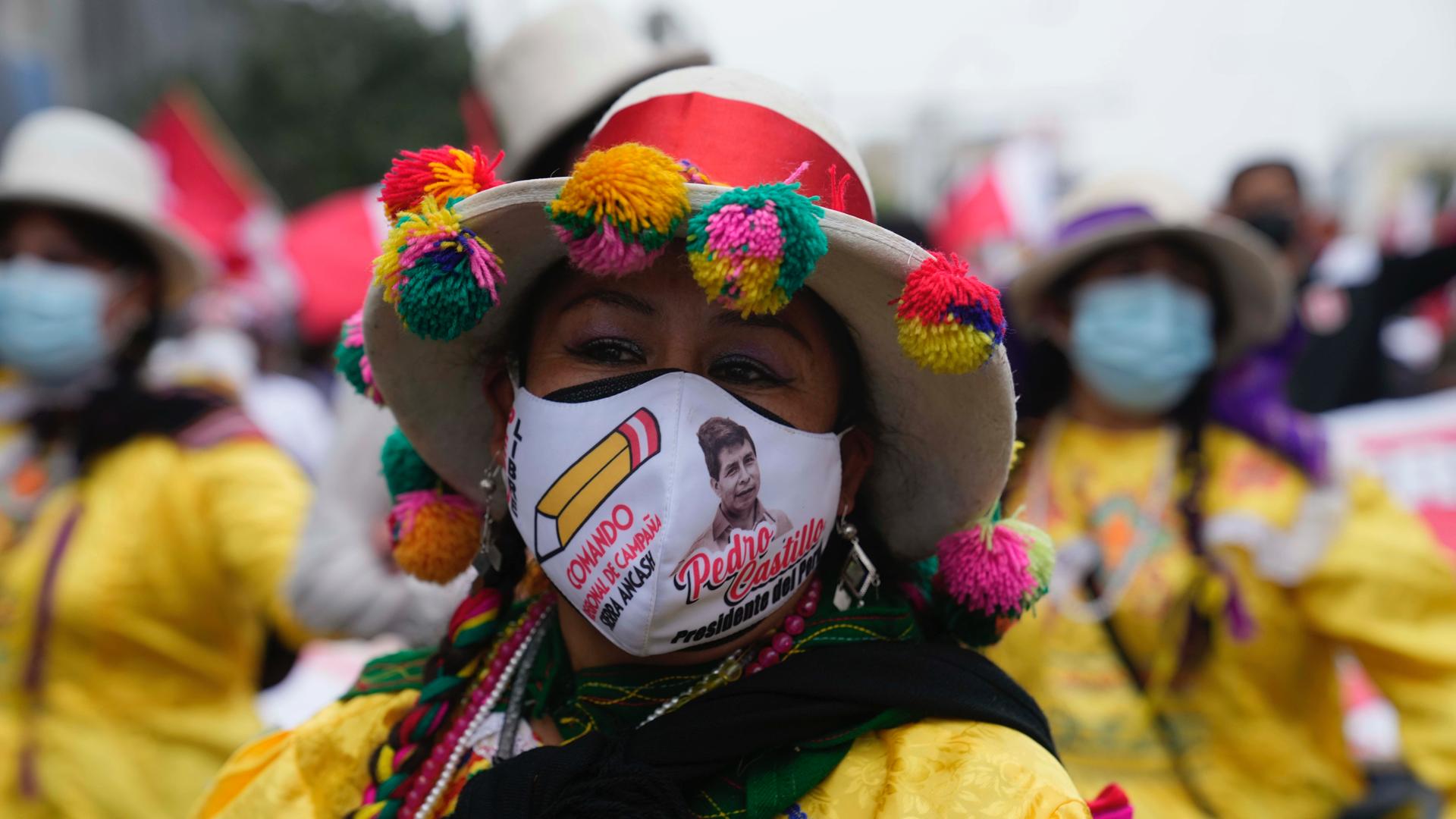Peru’s likely next president is popular with Indigenous voters. It’s made him a target for hate speech.
Socialist candidate Pedro Castillo has emerged as the virtual winner of Peru’s still-undeclared, June 6 presidential contest, but for him and his supporters, it’s still too early to celebrate.
Castillo, who holds a razor-thin lead over conservative Keiko Fujimori, has been the target of hate speech and anti-Indigenous rhetoric intensifying amid unsubstantiated allegations of voting fraud.
Fujimori and her party have leveled, so far, unproven claims of vote tampering, focusing on ballots coming in from the rural regions of the Andean highlands and Amazon rainforest, where Castillo has widespread support among a large Indigenous population. The complaints ignore Lima and other cities.
“We believe this is a racist strategy. They’re directing the focus toward rural and Indigenous areas and away from the cities in order to substantiate their claims.”
“We believe this is a racist strategy,” said Newton Mori Julca, a researcher with the Centro de Culturas Indígenas del Perú, a nongovernmental organization that advocates for Indigenous rights. “They’re directing the focus toward rural and Indigenous areas and away from the cities in order to substantiate their claims.”
Related: Peru polarized by two social conservatives in presidential runoff
Peru’s closely contested presidential election exposes a long-standing but rarely acknowledged problem in the country — a legacy of marginalizing Indigenous people, who account for more than 26% of the population, the Culture Ministry reported in 2017.
“I’ve never seen anything like this,” said Marco Avilés, a Peruvian writer and academic who studies racism across the Andes. “The white political and economic elites are very scared of this candidate.”
Castillo held 50.4% of the votes against 49.6% for conservative Keiko Fujimori, with all ballots counted, according to the National Office of Electoral Process. While elections officials are investigating Fujimori’s fraud claims, the US State Department and other international observers have said the election was clean. The swearing-in ceremony for a new president is scheduled for July 28.
Castillo, a 51-year-old schoolteacher, and farmer from the rural province of Cajamarca, campaigned appealing to rural voters. He appeared in televised debates wearing a straw farming hat, arrived on horseback to cast a ballot for the first round of voting in April, and adopted the slogan, “No more poor people in a rich country.”
Castillo has publicly identified himself as a working-class person, not as a member of a particular ethnic group. But he has shown solidarity toward Indigenous Peruvians. He pledged to take a larger portion of profits from mining companies that he says have “plundered” rural Peru and use the money for health and education. He has also proposed nationalizing mining, oil and energy sectors.
Many conservatives say they worry he will upend Peru’s free-market economy and drag the country toward an economic disaster similar to what has been seen in Venezuela. But not all his policies would be considered left of center, Avilés explained.
“He’s a leftist conservative,” Avilés said. “He is not for the rights of gay people or transexual people. He is not for abortion.”
Racist messages circulating online
In April, when Castillo was hospitalized in Lima for respiratory complications, former housing Minister Carlos Bruce suggested Castillo should’ve stayed in his native mountain province. In coastal Lima, racially charged jokes often imply people from the mountains are inferior.
Related: Russia expands ‘soft power’ in Latin America with Sputnik vaccine
Bruce, in reference to Castillo, wrote on Twitter: “It seems the abundant oxygen on the coast got to him because he’s used to the limited oxygen in the highlands.”
Bruce later deleted the tweet without explanation or apology.
On social media, Castillo’s detractors often use offensive terms to describe him, a person from the highlands.
In mid-June, an anonymous Twitter feed published an otherwise private group chat between two frustrated voters. The two men, 29-year-olds from Lima, according to corroboration by the website Sudaca, took issue with the overwhelming support Castillo received in Peru’s largely Indigenous Andean regions.
One of them wrote: “In those places, I’m going to throw my trash on the floor, spit on their streets, rape their women.”
One of the men lost his employment after the conversation was published, Sudaca reported.
Peru’s history of anti-Indigenous sentiment dates to the period of Spanish colonialism, explains Juan Carlos Callirgos, an anthropologist and historian at the Catholic University of Peru who studies race and ethnicity. Until World War II, some members of the Peruvian Congress described Indigenous people as beasts and not humans, while intellectuals argued white Europeans were a superior race.
“Believe it or not, there were intellectuals in Peru who said those things.”
“Believe it or not,” Callirgos said, “there were intellectuals in Peru who said those things.”
Castillo’s opponent was also the target of prejudicial comments. Some voters said they wouldn’t support Fujimori, a former congresswoman who is Japanese Peruvian, because of her background, inaccurately saying she was not born in Peru.
Related: Court blocks oil drilling in Peruvian Amazon
Voters in the mountains say they identify with Castillo not necessarily because of his race.
Juan Chilon, a farmer in Castillo’s home province of Cajamarca, says he believes Native people voted for Castillo because he has personally experienced the national government’s neglect of deep, rural Perú.
And Chilon adds that he’s not worried about the racist discourse on social media. After all, he says, Castillo may not be able to defeat racism, but he did very likely win the race.
